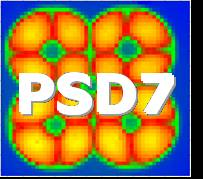Speaker
Prof.
Gerhard Lutz
(MPI Halbleiterlabor, Munich)
Description
A new generation of MOS-type DEPFET active pixel sensors in double
metal/double polysilicon technology with ~25µm pixel size has been
developed to meet the requirements of the vertex detector at the ILC
(International Linear Collider). The paper presents the design and
technology of the new linear DEPFET pixel cells including a module
concept and results of a feasibility study on how to build ultra-thin
fully depleted sensors. One of the major challenges at the ILC is the
dominant e+e- pair background from beam-beam interactions. The
resulting high occupancy in the first layer of the vertex detector
can be reduced by an extremely fast read out of the pixel arrays but
the pair-produced electrons will also damage the sensor by
ionization. Like all MOS devices, the DEPFET is inherently
susceptible to ionizing radiation. The predominant effect of this
kind of irradiation is the shift of the threshold voltage to more
negative values due to the build up of positive oxide charges. The
paper presents the first results of the irradiation of such devices
with hard X-Rays and Gamma rays from a 60Co source up to 1Mrad under
various biasing conditions.
Primary author
Dr
Ladislav Andricek
(MPI Halbleiterlabor, Munich)
Co-author
Prof.
Gerhard Lutz
(MPI Halbleiterlabor, Munich)
